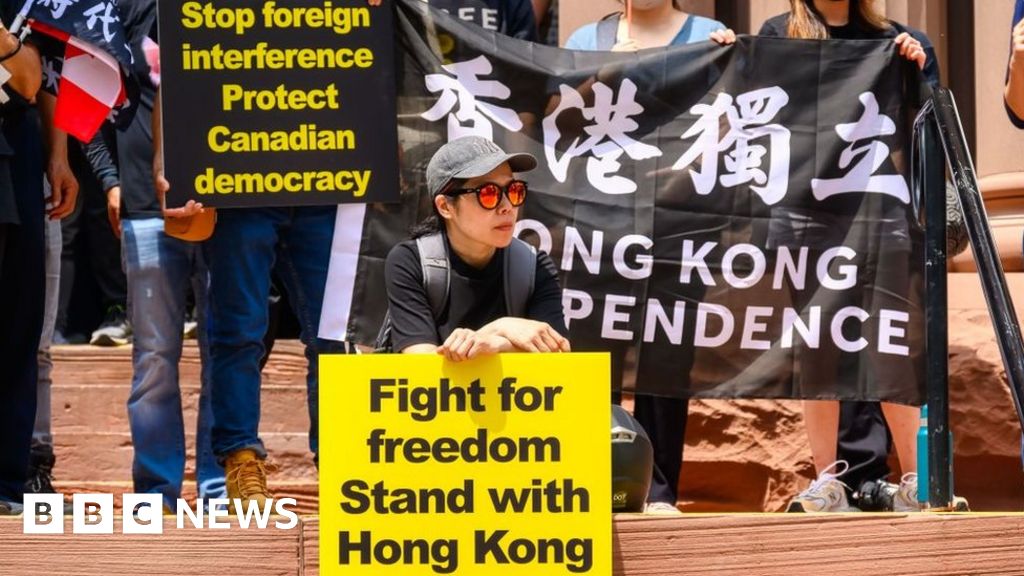The allegations kept mounting in Canada: Election-meddling by China, an Indian-backed assassination on home soil, and a campaign to harass Iranian dissidents. Is Canada especially vulnerable to foreign interference?
Michael Chong said it did not take long for him to become a target of Beijing.
In testimony before US lawmakers on Capitol Hill last year, the Canadian Conservative politician described how an alleged intimidation campaign against him was born after he spoke out against China’s human rights record in parliament.
He said that a Chinese official in Canada began gathering details about his relatives living in Hong Kong shortly after, and that a smear campaign against him was launched on China’s most-popular social media platform, WeChat.
“My experience is but one case of Beijing’s interference in Canada,” he said. “Many, many other cases go unreported and unnoticed, and the victims suffer in silence.”
…
One glaring problem, Mr Juneau said, is the out-of-date act governing the Canadian Security Intelligence Service (csis). It is almost 40 years old, designed with the Cold War in mind, “when the fax machine was the new thing”, he said.
Because of this, he said, the nation’s primary intelligence agency has been limited in its operations, focused on sharing information solely with the federal government.
This means possible targets are often left in the dark.
That was spotlighted by Mr Chong’s story. He only discovered that he had been an alleged target of Beijing through the media, despite csis having monitored threats against him for at least two years.
Buy a maple man a two-four and he’ll let you in his house for a shaker and a sleepover.
Hot layman take: We got complacent and subservient to US government and media influence, so when India and China became powerful it was more of the same.
Because it has freedom of speech and a thought of “surely it can’t be that bad”. Same as in the US. There, I saved you a click.
Canada has far less freedom of speech than the US. They’re also able to halt it by public announcement.
The Ottawa trucker movement exposed a lot of this.
What exactly did the occupation of the capital “expose”?
What gets halted by public announcement??
https://www.bbc.com/news/world-us-canada-68038172
It exposed Canada’s lack of freedom of expression and right to assemble. Many of the protestors were chuds, but you still have to follow the law when dealing with them.
Freedom of expression can be halted by public announcement, it isn’t a guarantee.
This is the best summary I could come up with:
In testimony before US lawmakers on Capitol Hill last year, the Canadian Conservative politician described how an alleged intimidation campaign against him was born after he spoke out against China’s human rights record in parliament.
He said that a Chinese official in Canada began gathering details about his relatives living in Hong Kong shortly after, and that a smear campaign against him was launched on China’s most-popular social media platform, WeChat.
The alleged targeting of Mr Chong, which first became public when intelligence reports were leaked to Canadian media, unleashed a fierce debate in the country around its vulnerability to foreign interference and the safety of its citizens.
In Mr Joubin’s experience, reporting these incidents to officials like the Royal Canadian Mounted Police (RCMP) has been a challenge, especially when additional work is needed to establish a credible criminal or civil case.
Both the RCMP and csis were criticised after the murder of Hardeep Singh Nijjar, a Sikh separatist that was killed in June in British Columbia, which Canada has alleged was done with the involvement of Indian government agents - something India denies.
The inquiry, led by Quebec appellate judge Marie-Josée Hogue, will be conducted in two phases, ending with a final report in December that will include recommendations on what Canada can do to deter future interference.
The original article contains 1,162 words, the summary contains 219 words. Saved 81%. I’m a bot and I’m open source!




